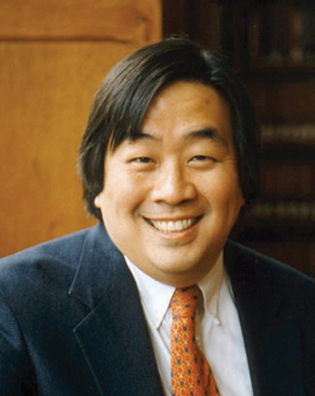 loading
loading
Light & VerityA nomination and a ruckus for Law School dean Harold ShapiroHarold Koh has been appointed by the president to be the state department's top lawyer, but controversy has erupted over his nomination. View full imageLast September, Yale Law School dean Harold Hongju Koh testified before the U.S. Senate about the Bush administration's "infamous list" of legal violations: Abu Ghraib, Guantanamo, torture, warrantless wiretapping of U.S. citizens, and more. This spring, Koh is slated to appear before the Senate again -- this time, to seek confirmation of President Obama's nomination of him as legal adviser to the state department. But at press time, the nomination's future was uncertain because of a storm of indignation from conservatives who claim that Koh wants to apply international law in this country at the expense of the Constitution. Finally arriving in March after months of rumors, Obama's call punctuates Koh's five-year term as dean, which ends in June. When Koh was offered the job, Yale president Richard Levin appointed longtime law professor Kate Stith as acting dean, summoning her home from a Rome vacation to take over immediately so that Koh could start preparing for confirmation. Koh's job description is to serve as top lawyer for the secretary of state and U.S. diplomats worldwide. The Office of the Legal Adviser has roughly 160 lawyers whose "work is as varied as all of international law," Koh's predecessor, John Bellinger, blogged in 2007. But, Bellinger noted, its lawyers "work especially hard on human rights and international criminal justice issues" -- precisely the areas to which Koh brings his greatest experience and passion. In the early 1990s, then-professor Koh helped students sue the U.S. government on behalf of Haitian refugees held at Guantanamo. Under Koh's leadership, clinic students also took international political leaders to court for alleged atrocities, winning more than $100 million. A week after Koh's nomination, New York Post columnist Meghan Clyne ’03 called him a "radical" who believes that "the distinctions between U.S. and international law should vanish. . . . On issues ranging from affirmative action to the interrogation of terrorists, what the rest of the world says, goes. Including, apparently, the world of radical imams." The basis for that last claim: a 2007 report from National Review Online in which New York lawyer Steven J. Stein contended that Koh had said -- at a Yale Club dinner in Greenwich, Connecticut -- that sharia, or Koranic law, could "in an appropriate instance . . . govern a controversy" in American courts. Robin Reeves Zorthian ’76, who organized the dinner as president of the Yale Alumni Association of Greenwich, called the claim "totally fictitious" in a letter to the Post. "If the dean of the Yale Law School had said, 'Yes, I want to impose sharia law in the American courts,' we would remember. There were 45 of us sitting there," Zorthian said in an interview with the Yale Alumni Magazine. Nevertheless, conservative commentators picked up the theme and painted Koh as un-American. Colleagues rushed to his defense, as did an unlikely ally, former solicitor general Kenneth Starr, who argued in a Yale Law School address that the Senate should defer to the president's nominations. At a Law School gathering in March celebrating his appointment, Koh had said that he will ultimately return to Yale. "This is my home. The way I teach is to tell war stories," Koh said. "After ten years, I've run out of war stories, so I've got to go get some more." The battle just started a little sooner than he expected.
The comment period has expired.
|
|